
Sophie has Started
The GEcoKelp team would like to welcome new IMR post doc Dr Sophie Corrigan to Flødevigen. Sophie will be working on the PROTEUS project, where she will assess the environmental impacts of seaweed harvesting and farming industries to increase sustainability and mitigate negative effects on biodiversity. She will also be assisting with some GEcoKelp activities and has already been in the lab identifying kelp epiphytes, and joined the team at Havforskermøtet.
You can stay up to date with Sophie's activities on the NorsKelp website.

Hei from Havforskermøtet
.jpeg)

Havforskermøtet, or the annual meeting of the Norwegian Marine Scientists Association was held in Arendal from 24-26th November '25. This year’s theme was “The effects of pollution and other human impacts on marine nature”, and there keynote speakers and talks on a range of topics from antibiotic resistance to ghost fishing and marine pollution.
The conference was well attended by the GEcoKelp team including Kjell Magnus, Hannah, Antoine, Tone, Sina and Karine. Kjell Magnus, Hannah and Antoine gave oral presentations on GEcoKelp research activities, while Sina presented a poster on her MSc research project. The conference also provided a valuable opportunity to catch-up with colleagues from other institutions, and connect with researchers across Norway and potential future kelp collaborators.
The team are now looking forward to next years meeting that will be held in Sweden!


.jpeg)
Taxonomy Trials
In early October, MSc student Emma traveled from Roskilde University (Denmark) to the IMR Station at Flødevigen where she would get started with the taxonomy component of her thesis. After a brief introduction to laboratory safety rules, she spent time in the lab with GEcoKelp post doc Hannah learning how to identify marine invertebrates from molluscs to worms and everything in between. Armed with several identification keys and a microscope, she spent several days observing, comparing and learning to recognize these tiny creatures in all their forms. Between identification sessions, Emma also took the time to discover Norway's wild and peaceful natural environment. Stay tuned to see what she finds!



Science in September
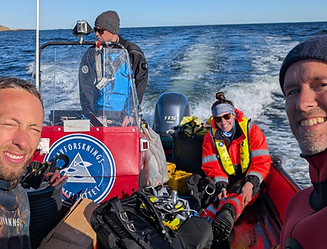


.jpeg)
The September whirlwind continued for the GEcoKelp team following their return from Svalbard. This included two days of drop camera fieldwork around Arendal to revisit some of the drop camera modelling sites from March '25, and undertake some additional drops to improve the resolution in shallow areas - all together another 60+ drops were completed!
A dive team comprised of Hannah, Kjell Magnus, Jonas Thormar (IMR dive officer) and Even Moland (author of En sjanse i havet) also visited three sites around Arendal to collect samples of Laminaria hyperborea for kelp-associated biodiversity assessments, as well as samples of L. hyperborea and S. latissima for a canopy trait collaboration with Swansea University. Several long evenings in the lab were needed to process all the samples, but was worthwhile as there were some spectacular sunsets!
We also welcomed two new team members in late September. Sina is an MSc student from the University of Bergen who will be completing her thesis as part of GEcoKelp and will be working in the culture lab to investigate the effect of temperature on sea urchin recruits (movement, growth, grazing). Sophie is a new post doc based at IMR in Flodevigen and while she will work primarily on the PROTEUS project, she will also be involved in GEcoKelp activities. In true Norwegian style, she spent her first weekend with some of the IMR team exploring local forests and picking mushrooms.

.jpeg)
September in Svalbard
The GEcoKelp and BlueArc teams joined forces again in September for a fieldwork campaign in Ny-Ålesund, Svalbard - the world northernmost settlement. The teams previously visited Ny-Ålesund in May '24, with this trip allowing them to add a seasonal component to their dataset, while also collecting samples for new research questions.
After flying into Longyearbyen and making a quick stop at the Husky Cafe, the team hopped aboard their 'private jet' to Ny-Ålesund, with weather conditions allowing for a birds eye view over sunny Svalbard. Loaded up with their 1000 photos of Svalbard and all their research equipment, the team arrived at King's Bay Research Station in time for dinner and a planning meeting for the next 10-days. Day 1 was a full day of training, with several members of the group receiving training on how the use the decompression chamber, while Hannah and Emma went on a polar bear safety course that included training with a rifle. Over the course of the following days, the team made the most of the good weather and glass like sea conditions to smash through some dive sites, checking off the most exposed locations at the entrance to Kongsfjorden and filling the lab with kelp samples that were processed for abundance, morphology and biodiversity, with samples of reproductive tissue and sea urchins collected where possible. They also visited an intertidal site one evening, with Kjell Magnus volunteering as the polar bear lookout!. As the week progressed, the team moved towards sites within the fjord and the weather began to turn, making dives more challenging, with up to 100% cover in the quadrats and 0% visibility. On the final few days, the team collected 'litter bag' experiments to quantify kelp decomposition rates, ran an urchin grazing experiment off the dock, and gave a presentation on all the research activities at the Norwegian Polar Institute (NPI). They also visited the Statue of Roald Amundsen and the local museum. Highlights of the trip included an sunset trip out the one of the glaciers, brunch at the weekends, and a trip to the local bar on Saturday!
For more information, check out the news article from our colleagues at the NPI.
.jpeg)

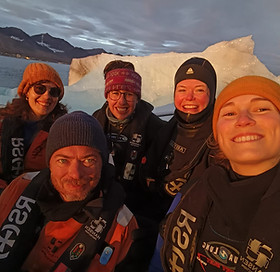



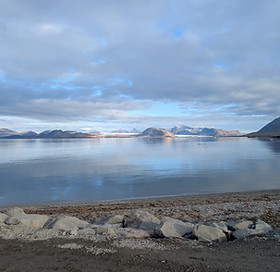




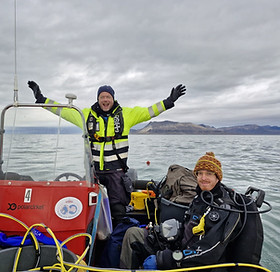

.jpeg)
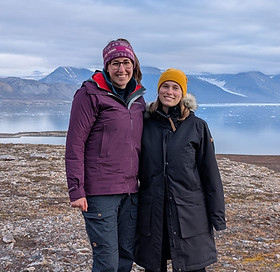
Rodger's Re-Location

For 3-weeks in August, Roger Lille-Langøy from the IMR's population genetics research group has swapped IMR Bergen for IMR Flødevigen. During this time he will help the GEcoKelp team with processing their ever growing selection of genetic samples, specifically extracting DNA from Laminaria hyperborea so we can map the genetic structure of this kelp species along Norway's coast. We would like to welcome Roger to the team and look forward to hearing more about his experience in Flødevigen.
Fjord Fieldwork - Porsangerfjord August 2025
In August 2025, the GEcoKelp and BlueArc teams joined force for a fortnight of intense fieldwork in northern Norway at the Institute of Marine Research's field station in Holmfjord - the northern most field station in Norway! Here the team undertook a number of tasks focused on sub-Arctic/Arctic kelp forests including:
- Drop camera video transects of kelp forest structure.
- Dive surveys of kelp and urchin abundance.
- Dive sampling of kelp forests for morphology, productivity and CHN.
- Dive sampling of kelp associated biodiversity (flora/fauna).
- Kelp genetics.
- Spore release from kelp reproductive material.
- Kelp trait surveys (Swansea University - UK collaboration).
- Ascophyllum nodosum sampling (Canterbury University - NZ collaboration).
Sidsel (BlueArc PhD Student) with the assistance of Victoria (BlueArc MSc student) kicked off the field campaign with a week of drop camera surveys within the fjord, targeting historic sites so they can understand how the kelp forests are changing over time. A week later the dive team arrived and were out everyday and in all weathers surveying and collecting kelp, while the lab team has the tasks of identifying and processing all the samples for the various analyses.
As with all the field trips, the team has many delicious dinners including Reindeer kebabs, spaghetti and meatballs, and of course the local delicacy - snow crabs. They were also treated to crab and other local treats such as waffles with cloudberry compote by boat captain Martin. The week was not without its ups and downs though, with punctured car tyres in remote areas, and lost passports among some of the challenges!
The team hope to be back in Porsanger for more research in the future!









Skagerrak Snorkelling
GEcoKelp post doc Hannah and volunteer Adam have been out monitoring tagged kelp (L. digitata) at three sites in the Skagerrak. These kelp have been monitored on a 6-week basis since Spring. When they were visited in June, the majority of individuals were relocated and appeared relatively healthy, however it seems that high summer sea temperatures may have been a bit of a challenge for some of these kelp. At the most sheltered of the three sites, all tagged individuals had disappeared, and a large bloom of Chorda filum and Sargassum muticum (and lots of jellyfish!) were observed, while at the other two sites, approximately 50% and 30% of individuals had been lost.
The GEcoKelp team are now exploring further research avenues to quantify the effects of increasing sea temperatures on kelp in the Skagerrak and along the rest of the Norwegian coast.
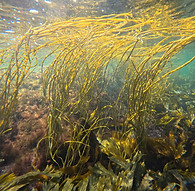
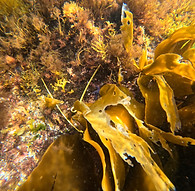
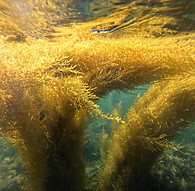
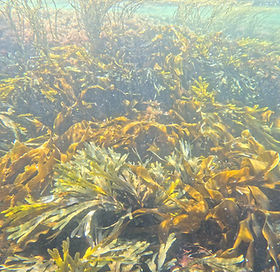
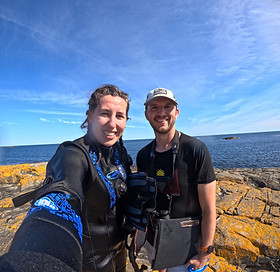
Out & About at Arendalsuka
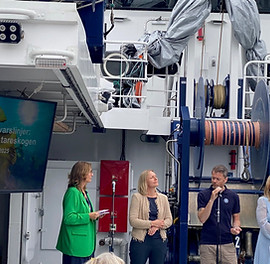
For 5-days in mid-August each year, Arendal hosts Norway's largest political gathering - Arendalsuka. The town is filled with exhibitions and events and brings together national and local political parties, non-governmental organisations, research institutions, industries and private companies. This year there are talks, panel discussions and debates covering a range of topics, with GEcoKelp WP lead Kjell Magnus involved in the "Naturens forsvarslinjer: Slik får vi tilbake tareskogen (Nature's lines of defense: How we can restore kelp forests)" event held on the Directorate of Fisheries vessel MS Fjorgyn. Members of the GEcoKelp team alongside other staff members from the Institute of Marine Research also hope to attend events focusing on valuing nature, and rising temperatures and tensions within the Arctic, as well as some of the evening social activities to network across sectors.
Runde Revisited - July 2025
Third time is a charm! In late July, Hannah, Tone and Adam returned to Runde for the third time this year to check up on the tagged intertidal kelp (Laminaria digitata and Laminaria hyperborea) and to undertake some seasonal kelp-associated biodiversity assessments. Once again, a dance to the weather gods paid off and the team had a wonderful weather window coupled with some great tides (albeit very early in the morning) for their fieldwork days. They managed to get to all four sites to take kelp morphology and growth measurements, re-tag some kelp, undertake biodiversity quadrats and sample L. digitata holdfasts for associated biodiversity assessments. It was interesting to see seasonal differences at the sites, with a bloom in epiphytes and filamentous algae occurring in many areas, alongside a die off of L. hyperborea blades in some patches (potentially as a result of the recent heatwave......).
Having been so successful with their fieldwork, the team were able to spend a few days in the laboratory at Runde Miljøsenter where they 'picked' some of the samples from a previous research campaign - sorting L. hyperborea holdfast and stipe biodiversity samples in to macrofauna and macroflora. The macrofauna comprised at least 40 species including squat lobsters, gastropods, chitons, amphipods, crabs, shrimp, fish, sea urchins, brittle stars and ostracods. The macroflora samples were sorted to functional groups, dried and weighed. There are still plenty more samples to go though.
As is tradition, the team ventured up the bird mountain one evening where they were greeted by swarms of midges as well as the much loved puffins. It will be one of the final nights the puffins are at the mountain before they head back out to sea for Autumn/Winter. It was however sad to hear that this year, only 20% of the chicks survived, likely due to declines in their favorite food (sand eels).
The team hope to be back in Runde one more time this year (September/October) to check up on the kelp before the light and weather become too limiting!
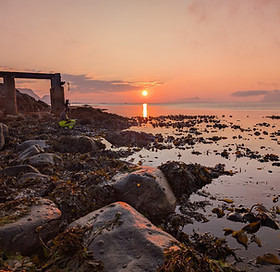
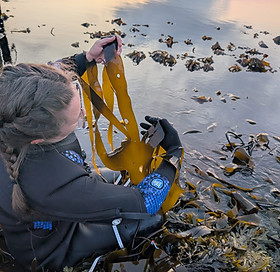
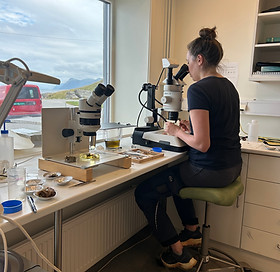
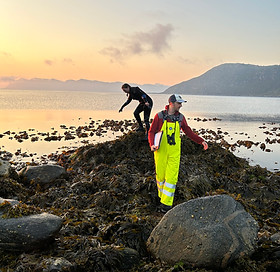
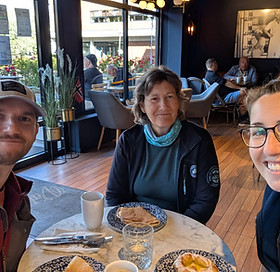
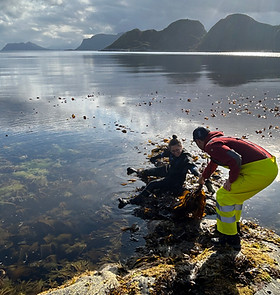
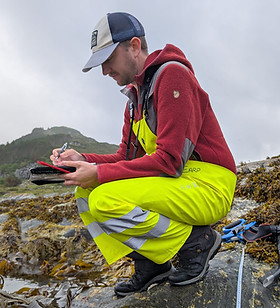
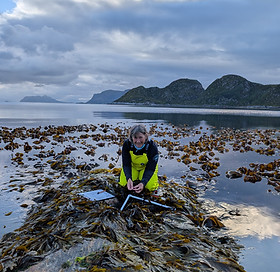
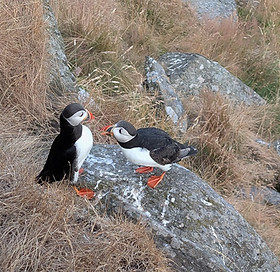
Sea Urchin (Kråkebolle) Sleepover
The GEcoKelp team have recently been gifted some recently settled green sea urchin larvae (Strongylocentrotus droebachiensis) from Kjell Magnus. The green sea urchin is an aggressive kelp grazer in some areas including northern Norway, and can overgraze the kelp resulting in the formation of an urchin barren. Over the coming months, Antoine, Hannah and Tone hope to run some experiments in their 'Sea Urchin Hotel' to see how variations in temperature influence the juvenile urchins. Stay tuned to see what they find out!
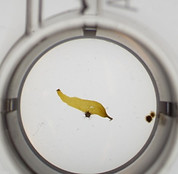
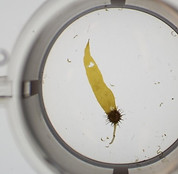
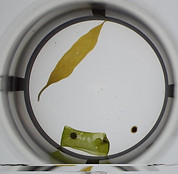
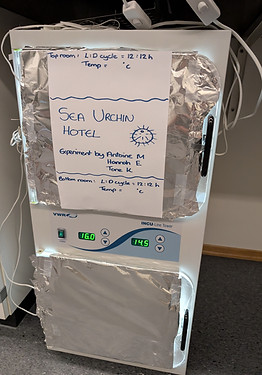
Bonjour from Brest - July 2025
In early July, team GEcoKelp, including Thomas, Karen, Kjell Magnus, Hannah, Antoine and Grace ventured to Brest (Brittany, France) for the 14th International Temperate Reefs Symposium. The conference brought together over 400 seaweed enthusiasts for a week of talks, posters, networking and generally all things science!
After a day of workshops focused on kelp restoration and sea urchin barrens, the conference kicked off with a cable car ride to the Ateliers des Capucins for an informal icebreaker, needless to say ice was needed as the weather was not temperate but baking hot! Each morning of the conference there were a number of insightful plenary and keynote speakers followed by 4x parallel sessions of talks to choose from. During the week, and focusing on the Norwegian context in particular, Karen gave a talk on kelp productivity along the Norwegian coast, while Grace provided initial insights into her Norwegian nutrient uptake experiment, Kjell Magnus summarized the findings from his recent manuscript on heatwave impacts and fish communities in the Skagerrak, and Hannah presented a poster describing her ongoing work with Laminaria digitata along the Norwegian coast as well as the drop-camera fieldwork undertaken in the Skagerrak. Alongside the conference there were also many opportunities to connect with new and long-time colleagues and friends to discuss ongoing and future collaborations both within Norway and beyond.
The conference was rounded up by a dinner at Oceanopolis, where the team were treated to views of temperate reef aquarium tanks while they ate, before heading on to a local bar to continue the celebrations. During this time, Thomas was presented with the ‘ITRS Award’ for lifelong service and contributions to marine science. Following the conference, Antoine and Hannah went on an intertidal seaweed safari along the coast, while Grace went diving to explore subtidal kelp forests. The team left Brest feeling inspired (albeit a little exhausted), and are already looking forward to the next ITRS in New Zealand in a few years time!









Return to Runde - May 2025
Just in case you thought the GEcoKelp team had a few days to relax, fear not, they were off again at the end of May! This trip saw Hannah, Antoine and Adam return to Runde on the west coast of Norway to monitor some ongoing research. In particular it was an opportunity to visit tagged kelp - Laminaria digitata and Laminaria hyperborea - at multiple intertidal sites to see how much they had grown over the last 50 days. Turns out (once they had been located!) that the L. digitata had grown quite substantially, 0.5 cm per day! They also sampled some individuals (62 kg to be exact), with the longest individual measuring over 2.75 m and the heaviest weighing 900g!
The team also collected samples of egg wrack (Ascophyllum nodosum) from sheltered and exposed intertidal shores in the region that will be analysed by an MSc student as part of an international collaboration with GEcoKelp Advisory Board member Associate Prof. Mads Thomsen investigating habitat cascades. To round off a successful trip, the team treated themselves to a midnight hike up the bird mountain to see the puffins.
All the research in Runde will be compared to similar GEcoKelp research that is being undertaken around Arendal on the southern coast of Norway, meaning there is plenty more fieldwork and sample processing for the team in the coming weeks.





Ice Ice(land) Baby - May 2025
In May the GEcoKelp team (Thomas, Hannah, Antoine) joined forces with members of the BlueArc team (Albert Pessarrodona, Sidsel Pedersen) for a two-week fieldwork adventure in Iceland. Working with Karl Gunnarrson, Lilja Gunnarsdóttir and Jón Tomas Magnússon at the Marine and Freshwater Research Institute (Hafrannsóknastofnun), they set out to investigate the structure of kelp forests along the west coast of Iceland. A team of divers undertook transect and quadrat surveys of kelp and sea urchin abundance, and brought samples to the laboratory where the land team took morphology measurements. They also conducted multiple ‘bucket experiments’ to understand how temperature influences kelp physiology and sea urchin grazing. The team experiences all four seasons while in Iceland, from snow and hail to sunbathing weather (and a lot of wind). This meant they had to be adaptable and ready to head out in the boat whenever there was a window, and to have some samples at the lab to process when the weather was less favorable. Despite the challenges, the team managed to characterize kelp forests along a depth gradient at 6 sites, measure >900 kelp and ~500 sea urchins, and have multiple manuscripts planned. Beyond the research, the team also got the opportunity to visit some of the sites in Reykjavik, the Blue Lagoon, dive between the tectonic plates at Silfra, and had a delicious home-cooked Icelandic meal in a heritage home. All together, the trip was a great success and the team hope to be back for more in the future!

.jpeg)









G'day Grace - Take 2

Video of the GEcoKelp team undertaking one experimental run (they did 2-3 of these per day)


In April we were lucky to welcome PhD student Grace back to IMR Flødevigen to repeat her experiment, allowing us to gain an insight into seasonal variation in kelp responses to nutrient enrichment in the face of ocean warming and coastal darkening. Fueled by Easter eggs, Grace, Hannah and Antoine spent two weeks in the aquarium hall running the experiment which involved taking a number of water and tissue samples, and a lot of PAMming (pulse amplitude modulation fluorometry), as well as a compulsory time lapse video! Following on from the experiment, Grace spent time at the University of Agder (UiA) where she used the autoanalyzer to look at nutrient concentrations in the water samples. Other samples will be analysed in house, or sent to collaborators at the Stable Isotope Biogeochemistry Laboratory (SIBL) at Durham University (UK).
During her time in Norway, Grace also assisted with the drop camera surveys in Skagerrak and joined the Runde field trip where she assisted with kelp morphology work (intertidal and subtidal) and collaborated on a piece of work aiming to understand how coastal nutrient run-off may influence kelp forests.


.jpeg)
.jpeg)
Research in Runde - April 2025
In early April, a GecoKelp team comprised of Thomas, Karen, Hannah, Antoine and Grace were joined by collaborators/colleagues/students Jonas, Henning, Sidsel, Adam, Marcel and Angelico, plus multiple kilos of research kit ventured to the island of Runde on Norway’s west coast for an intense 10 days of kelp fieldwork. Based out of Runde Miljøsenter, the team undertook a vast array of surveys, sampling and experiments including:
-
Intertidal and subtidal kelp abundance and morphology surveys
-
Intertidal and subtidal kelp associated biodiversity surveys
-
Subtidal kelp genetic samples
-
Subtidal kelp drop camera recordings
-
Subtidal kelp nutrient physiology experiment
-
Water sampling for nutrient assessments
-
Macroalgae sampling for silica analyses
The surveys took them onto rocky shore and beneath the waves on Runde and several of the surrounding islands, and allowed them to dive in pristine and human-influenced kelp forests. They were also able to venture up Runde’s bird mountain where they spotted puffins, sea eagles, razorbills, gannets and great skewers and even got a glimpse the Aurora borealis!Now back at home, the team have lots of data to enter and analyse, and kit to prepare for their next adventure……watch this space for more updates 😊



.jpeg)










Diving with the Drop Camera

Videos of the GEcoKelp team deploying the drop camera, and the camera descending into a kelp forest habitat.
The GEcoKelp team at IMR Station at Flødevigen have just undertaken an intense drop camera field campaign around Skagerrak. The team were incredibly lucky with the weather and managed to visit 460 sites in just 8 days. In total they pulled the 8kg camera rig over 5km from the seabed, ate an undisclosed number of biscuits and generated many hours of videos for analysis over the coming months!
A BIG thank you must go to to PhD student Grace, MSc students Antonia, Erin and Canelle, Erasmus intern Alessandro, and boat captains Jonas, Sebastian and Aline who were key to making the work a success :)







Ocean Decade endorsement
Very exciting news - the GEcoKelp project has been endorsed by UNESCO’s Intergovernmental Oceanographic Commission's Executive Secretary as part of the United Nations Decade of Ocean Science for Sustainable Development!
The Ocean Decade brings together an array of global stakeholders who will generate data and knowledge to underpin robust science-based management in order to promote a productive, sustainable, resilient and inspiring ocean.
The GEcoKelp project will be aligned with the Marine Life 2030 Programme that "seeks to transform the observation and forecasting of marine life for the future for the benefit of all people".

Come to the kelp side (we have cookies)

There is an exciting opportunity for a post doc researcher to join our expanding kelp research team at the IMR Station at Flødevigen. The candidate will work alongside the GEcoKelp team on the PROTEUS project to further our understanding of the impact of harvesting on kelp forests in Norway and enable evidence-based management and mitigation strategies. Closing date for applications is Sunday 23rd February.
For more information check out the link (available in English/Norwegian):
Science in Svalbard - January 2025
January got off to a busy start for the GEcoKelp team, which included a visit to IMR Station at Flødevigen for PI Thomas and WP lead Karen, the submission of a book chapter and a lot of planning for upcoming reviews, experiments and field adventures.
For post doc Hannah, January also included an exciting trip to Longyearbyen in Svalbard to participate in the Arctic Coastal Biodiversity Observation Network (ARC-BON) workshop at the University of Svalbard (UNIS). The workshop ran over three days and brought together an international team of researchers from Norway and beyond and spanning multiple career stages who are undertaking marine research in the Arctic region. Presentations covered topics ranging from pelagic (meroplankton) and benthic (macroalgae, nudibranchs, invasive non-native species) diversity, to the impact of climate and human stressors (plastic pollution), and the monitoring of environmental parameters (temperature, turbidity) using loggers and satellite imagery. The research presented covered Arctic regions from Canada to Greenland, Iceland and Svalbard. Hannah gave a talk highlighting the work undertaken by both the BlueARC and GEcoKelp projects to reveal the impacts of climate change on kelp forest structure and functioning within Arctic regions. Overall the workshop provided a unique opportunity to see the breadth of research being undertaken in the Arctic, as well as a platform to network and collaborate with other people working in the area. One of the biggest challenges of the meeting was re-locating her snow boots at the end of each day!
The workshop was undertaken during the polar nights meaning the sun did not rise or set in Longyearbyen for the entire 5-days and instead the town remain in the dark with temperatures dropping to a chilly -20 (although this felt more like -30°C) and it snowed on multiple occasions. Woolly layers and reflective outerwear was a must for being outside! Despite the cold and dark, Hannah got the opportunity to sample Arctic cod, visit the Svalbard museum, see the Aurora borealis, and in a brief moment of distant light, hike along the shore and take some photos of the landscape! On the flight back to Norway she was also fortunate to get an aerial view of Bear Island.
The team are looking forward to heading back to Svalbard later in 2025 to undertake more kelp-forest research and have successfully secured additional research funding to support this work!

.jpeg)


Happy Kelpmas


As we move towards the festive season, there is a final piece of good news from the GEcoKelp team - we have successfully seeded L. hyperborea on to Green Gravel in the aquarium, with baby kelp visible under the microscope. We will keep monitoring kelp growth over the next few months before outplanting them in the field.
Check back with us in 2025 for more updates on the kelp babies and news from our adventures including Thomas and Karen's trip to the United Nations Climate Change Conference (COP) in Baku, Azerbaijan, Hannah's participation in the Arctic Coastal Biodiversity Observation Network (ARC-BON) workshop in Svalbard, alongside team field trips to Runde, conferences in Canada and France, and multiple laboratory experiments!
Happy Holidays & All The Best For 2025
The GEcoKelp Team
Trip to Tromsø -Havforskermøtet 24
From 25-27th November, a group of researchers from the IMR Station at Flødevigen including Hannah and Karine from GecoKelp team along with members of the NORSE project headed to Tromsø for the Annual meeting of the Norwegian Association of Marine Scientists (Havforskermøtet). The theme of the meeting was "Effects of climate change and climate mitigation measures on marine ecosystems".
Upon arriving the team had an evening to explore the snowy streets of Tromsø, with the number of Christmas lights making it feel like a winter wonderland. The following two days consisted of interesting panel discussions on offshore wind and ocean warming impacts, and a diverse array of presentations from researchers and industry representatives covering topics from ocean mapping, copepods, deep sea mining, blue carbon and Arctic ecosystems. Collectively the presentations provided a great overview of the research being undertaken along the Norwegian coast, There was also a poster presentation session in which Hannah gave an overview of the GEcoKelp project and some of the initial findings from Rowan's MSc and Grace's PhD research - check out the poster here.
The coffee and lunch breaks provided great opportunities to chat with other conference participants, allowing ideas to be shared and networks to be built. There was also a delicious conference dinner, as well as a Norwegian Christmas dinner to enjoy! Overall the conference was a great experience and the team are looking forward to returning to Tromsø for fieldwork in the future, and hosting Havforskermøtet 2025 in southern Norway.





Boating Bonanza

Fresh of a flight from Australia, GEcoKelp post doc Hannah along with WP co-lead Karine have undertaken a 2-day course at IMR Station at Flødevigen to get their Norwegian boat driving licenses (Båtførerprøven) and VHF radio certificates.
After a quick introduction to the IMR boats, they will be ready to head out on GEcoKelp field adventures in Spring/Summer 2025!
GEcoKelp goes Global
November 2014 saw GEcoKelp post doc Hannah embark on an exciting trip down under where she was able to catch up with members of the GEcoKelp team based at the University of Western Australia (Thomas, Karen, Antoine, Grace), as well as old and new members of the BlueARC team who have/will visit IMR Station at Flødevigen (Thomas, Karen, Albert, Sidsel).
The trip started off with the annual Wernberg Lab retreat at Jurian Bay that brought together over 25 people researching diverse, kelp-related topics. This was a great opportunity to see what everyone was working on, to celebrate successes and plan/collaborate into the future. During the retreat, the team also undertook a snorkelling bioblitz on the Great Southern Reef, at a site dominated by the kelp Ecklonia radiata. All together, the retreat provided a great insight into the structure of and opportunities within the lab group (including long term monitoring), as well as a chance to explore some local beaches and kelp forests, and learn some new boat mechanic skills.
The second week of the trip was spent in Perth and was an opportunity to check out the facilities on the UWA campus and at the Indian Ocean Marine Research Centre at Watermans Bay. The visit to Watermans Bay was particularly insightful and provided an insight into how to design some of the aquarium facilities in Norway, and included a sneak peek at their Green Gravel work. During this week, many conversations about ongoing and future collaborations between the Norway and Australia team were had, a grant proposal was submitted, the writing of a book chapter was completed, and plans for GEcoKelp 2025 were outlined! Not bad for a weeks work right?
There was even a little bit of time spare to exploring Perth center, Fremantle, Bold Park and Scarborough,, a trip to the Salt market for some outdoor Pilates, a swim and some shopping, and a kangaroo steak for dinner before jetting back to Norway.







Hotplate Heaven

Its been an exciting week for the GEcoKelp team at the IMR Station at Flødevigen following the arrival of the much anticipated experimental 'hotplates'. These shiny new experimental units were based off a design by Dr Reina Veenhof and will be used in early 2025 for heatwave experiments.
There is a little more shopping to do before the units azre fully operational, but stay tuned to find out how we get on!
G'day Grace
It was a busy few weeks IMR Station at Flødevigen for Grace, a visiting PhD student from the University of Western Australia. For the final chapter of her PhD research, and during her first visit to Europe, Grace ran an aquarium experiment to investigate nutrient uptake dynamics in two kelp species (L. hyperborea and S. latissima) under various environmental conditions including different temperatures (simulating ocean warming) and light levels (simulating coastal darkening), in filtered seawater and seawater containing phytoplankton.
Due to the complexity of the experimental design and the number of replicates required, the experiment was run continuously over a 2-week period, with at least 3x experimental runs with a minimum of 8 replicates per run - the phrase EAT, SLEEP, EXPERIMENT, REPEAT was definitely true, with the team spending long hours in the aquarium hall running the experiment, processing samples, acclimating kelp for future runs and labeling what seemed like millions of tubes, bags and pots. Through collaborations with a team of researchers at IMR, seawater, tissue and plankton samples will be processed, while the data that was available instantaneously will be used by Antonia for her MSc thesis.
Outside of her experiment, Grace also had the opportunity to visit Arendal and Oslo, became an expert in foraging mushrooms and embraced Norwegian sauna culture :) She will be returning in Spring to re-run the experiment to look at variation across spatio-temporal scales.

Time lapse video of an experimental run for Grace's experiment (3x runs were done each day!).

.jpeg)
.jpeg)
.jpeg)

Autumn madness!


The kelp reproductive season is upon us and that only means one thing -Antoine is over from Australia and working with Hannah and Tone to establish some kelp cultures for use in future experiments.
The team successfully collected reproductive specimens of L. digitata and L. hyperborea. These were processed for genetics before we induced sporulation. While this sounds like a simple task, it has kelp the team busy making red light boxes and culture media and cleaning the cultures to remove and stoaway diatoms etc. The cultures are being kept under red light in an incubator and photographed regularly while they wait for Antoine to return in spring.
At the same time, Thomas, Karen and the smallest member of the GEcoKelp team visited IMR to discuss research plans and logistics for 2025 - this also included a delicious, typically Norwegian meal of Reindeer!

Antonia's Autumnal Heatwave
Its a busy Autumn for the GEcoKelp team with national and international students visiting the IMR Station at Flødevigen to undertake aquarium experiments and talk about all things kelp!
Antonia, an MSc student from the University of Agder has teamed up with seagrass researchers on the NORSE project run a pilot experiment in the outdoor mesocosms at the IMR Station at Flødevigen. The experiment aims to investigate the influence of coastal darkening and marine heatwaves on juvenile kelp (Laminaria hyperborea and Saccharina latissima) and involves measuring kelp growth, biomass and pigmentation.
Due to extremely windy conditions, the outdoor mesocosms were sealed for the duration of the experiment meaning weekly monitoring was not possible. After one-month, the mesocosms were opened and we found that all the kelp in the heatwave treatment had disappeared, all that was left were the zip tie markers! While this isn't ideal for the research project, it demonstrates that science does not always go to plan.
We have re-framed Antonia's project and she will now plans to assisting Grace, a visiting PhD student from the University of Western Australia with her upcoming research.


Punching for Pilot Experiments - September 2024

Tone and Hannah, have been busy in Flødevigen this week setting up pilot experiments to look at the growth and reproduction of Laminaria hyperborea that have been kept on lines on the jetty or in the aquarium. Rather than working with whole kelp individuals, they have been punching discs in sections of the blade. These discs are being kelp in a culture medium in a light and temperature chamber and will be monitored over the next few weeks by the GEcoKelp team. If successful, this pilot experiment might provide a resource-effective means of conducting experiments on this kelp species over the coming years.
Make sure you come back to see what that found.




Fieldwork in Svalbard - May 24
In May 2024, members of the GEcoKelp team joined researchers from the BlueARC project led by Dr. Karen Filbee-Dexter to undertake kelp forest research in Svalbard, a Norwegian archipelago in the Arctic Ocean. Svalbard's coastal zone is changing rapidly with climate change and understanding the consequences of these changes on high-Arctic kelp forests is of paramount importance.
The team undertook extensive scientific diving in chilly conditions to monitor kelp forests around Svalbard, and collect samples of several kelp species for morphology and genetic analyses. More information on the trip can be found on the Norsk Polarinstitutt and the UWA's websites.

.jpeg)
_JPG.jpg)
Video of Prof. Thomas Wernberg explaining the importance of Arctic kelp forests and the work of the BlueARC project.
GEcoKelp Kick Off Meeting in Runde - May 2023

The GEcoKelp project got underway in May 2023 with a kick off meeting at Runde Miljøsenter, located on the small island of Runde in western Norway.
Many members of the GEcoKelp team joined the meeting to start planning out the research activities that will take place over the next few years. There were also several opportunities to head out on the research vessel around the island where the dive team were able to hop in the water and collect the first batch of kelp samples for morphology measurements and genetic analyses!
The team are hoping to head back to Runde for more fieldwork in the second year of the project so stay tuned for more photos from this beautiful island!



